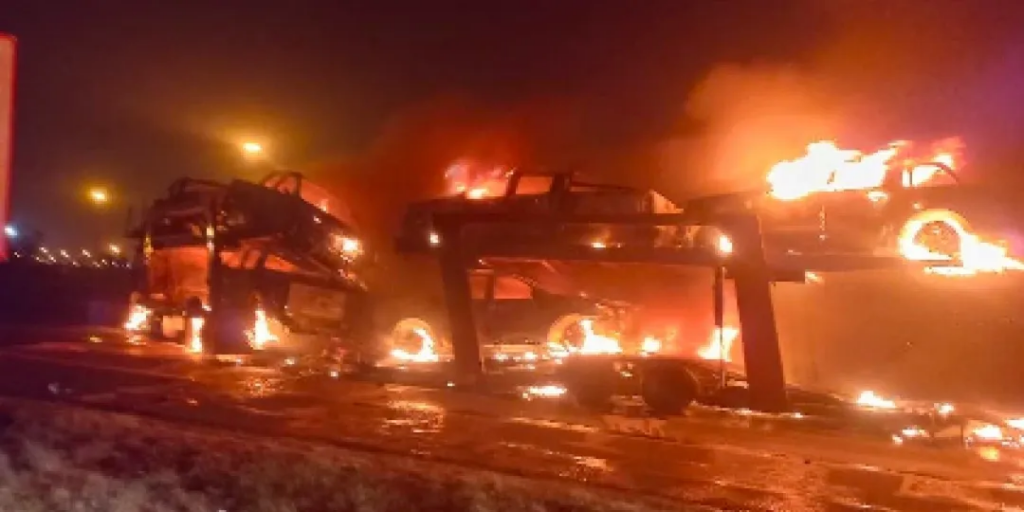
The Road Freight Association (RFA) has urged the government to intervene in the “senseless destruction” of trucks on the N3 highway and other routes as the crime is crippling the logistics sector and ruining South Africa’s reputation as a safe business destination.
RFA CEO Gavin Kelly has warned that the cost to businesses runs into millions of rands in damages, while some logistics firms are simply shutting their doors due to the ongoing risk of violence.
His warning comes after the latest strike on a car carrier that protesters torched while it was travelling on the N3 near Vosloorus on Sunday night. Protesters also looted several trucks. Images and videos of the blazing truck and its vehicle of cargo were shared widely on social media this week.
Kelly urged the government to take swift action before more cargo carriers avoid SA roads and ports and insurers decide not to foot the bill for business loss claims.
“Depending on the category of vehicle, the type and value of cargo, and the specialised equipment required for the cargo, the financial impact can be anywhere from R3-R10 million,” Kelly said.
“The consumer will foot the bill for what has happened, through indirect charges relating to the cost of logistics, and as risk appetite softens and insurers demand more for premiums. Supply and demand will dictate cost,” he said,
Around 80% of goods moved in South Africa are transported by road.
“Simply put, when trucks stop, South Africa stops. The looting and violent attacks on road freight logistics vehicles, which occur whenever someone is upset, and the wanton destruction of trucks and goods, have begun to undo the status of South Africa as a safe haven for investment, and as an efficient logistics hub for foreign traders,” Kelly said.
“What started out as sporadic incidents on one or two routes has become the norm, on any and all routes of the total supply chain, and is affecting destinations and originations. With the total supply chain now being impacted, the economic effects are far-reaching,” he warned.
While short-term losses run into millions of rands, the long-term impact is “incalculable and will be felt long after the burning has stopped and when it is far too late”.
He added that the cost to the economy of loss of income through businesses closing was even greater than the immediate losses.
“There are instances where small businesses have lost their only truck, or trucks. This means loss of revenue for the business, loss of salaries paid to staff who would no longer have jobs, and loss of revenue through the services and support the business uses such as fuel, storage, maintenance, tolls, staff requirements and licensing,” Kelly said.
He said cargo owners currently moving freight through Durban port would take their cargo through neighbouring countries.
“This has already been happening as South African ports become inefficient and the surrounding ports develop, improve and drive up efficiencies. South Africa’s ‘Gateway to Africa’ status has been lost and these attacks will further cement the move of transit freight from South Africa to neighbouring countries. Port revenues will drop,” he said.
“Costs relating to insurance will increase, as the risk to insurers has increased over the last four years, partly as a result of the constant attacks on freight. The evidence is clear that road freight is attacked as it is an easy target, and the looting prospects are huge in terms of the quantity and the variety of goods that can be looted.
“The association reiterates its call to the President to ensure that common violence is dealt with. The level of opportunistic crime is far too high, it needs to be dealt with. Now. Time and again the association has called for the rule of law to be shown to be firmly in place, and that the safety and security of South Africa and its people be ensured. Government needs to act swiftly and decisively to bring an end to this senseless destruction,” Kelly said.
Source :- Source: Twitter/@YusufAbramjee (15 September 2022)



